In Passing

Los Angeles
Jan Murray, comedian, actor
Jan Murray, one of a generation of comics who honed their skills on the Borscht Belt before conquering television – in Murray’s case, as one of the medium’s early game show hosts – died at his Beverly Hills home July 2. He was 89 and had been in poor health for the last few months.
Murray was a headliner in vaudeville and Las Vegas through the 1940s and ‘50s, until the advent of television offered a new direction.
Murray emceed nine game shows during television’s golden era. One of the most popular was “Treasure Hunt,” which aired on ABC and later NBC from 1957 to 1959, in which the contestant who gave the most correct answers chose one of 30 “treasure boxes” for a prize, which was not always delightful. It could have been anything “from a head of cabbage to a check for a large sum of money,” according to the book “The Complete Directory to Prime Time Network TV Shows.”
Although highly successful in game shows, Murray shifted to movies in the late 1960s and appeared in a variety of roles, including a Nazi war criminal in “A Man Called Dagger” (1967) and Annette Funicello’s father in “Thunder Alley” (1967).
Murray performed comedy into his 80s.
“You get exhausted when you’re 80,” he said. “Until I was 80, I wasn’t exhausted. There’s no medicine like being on stage hearing people laugh.”
He quit performing at 83, when his asthma worsened and threw off his timing.
Belmont, Mass.
Theodore Levitt, writer, editor
Theodore Levitt, the former Harvard Business Review editor who coined the term “globalization,” has died. He was 81.
Levitt, who had been battling prostate cancer, died at his home in Belmont on June 28.
Levitt first used the term “globalization” in a 1983 Harvard Business Review article about the emergence of standardized, low-priced consumer products. He defined the phenomenon as the changes in social behaviors and technology that let companies sell the same products around the world.
“The world’s needs and desires have been irrevocably homogenized. This makes the multinational corporation obsolete and the global corporation absolute,” Levitt wrote in “The Globalization of Markets.”
An authority on marketing, Levitt first earned fame in 1960, after publishing “Marketing Myopia.” In the Harvard Business Review article he called marketing a “stepchild” in most corporations that concentrated too much on creating and selling products. He said certain companies and industries were declining because management defined the scope of their businesses too narrowly.
Levitt wrote or co-wrote eight books and shared the record with the late Peter Drucker for publishing the most Harvard Business Review papers.
While serving as the magazine’s editor from 1985 to 1989, Levitt transformed the magazine from an academic publication to a reader-friendly magazine read by business leaders.